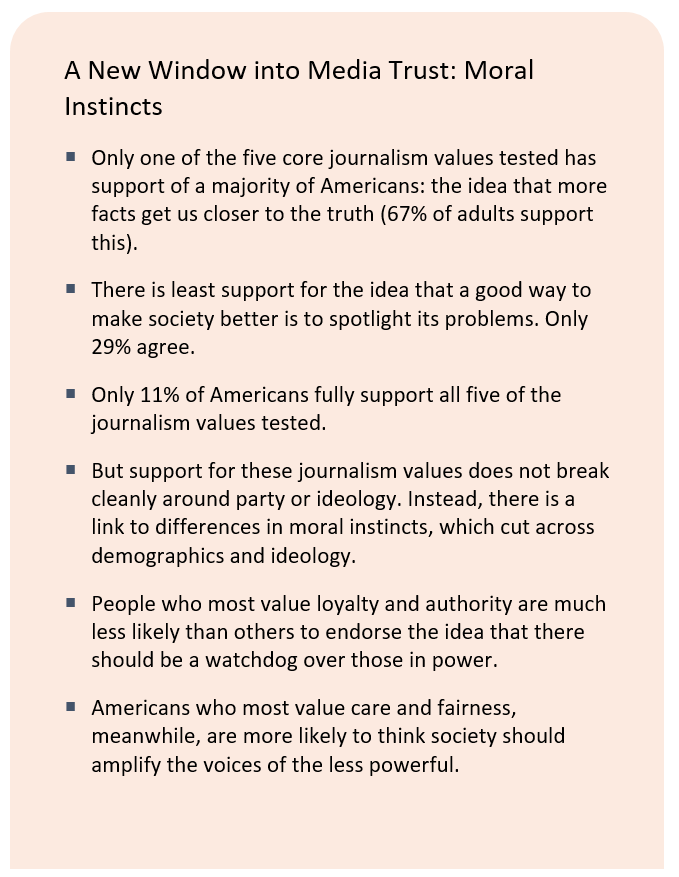
April 14, 2021
The deep divides over trust in the news media are usually portrayed as largely ideological. Democrats are seven times more likely than Republicans to say they trust the mainstream media, and independents are four times as likely.[1] But the argument over media trust often has the feel of people talking past each other—many journalists denying they slant the news to help one party over another, while many of their critics, especially on the right, scoff at that denial.[2]Still others, particularly on the left, question whether some basic notions of journalistic independence and open-minded inquiry are a delusion and the press should become more strictly partisan.[3]
A major study by the Media Insight Project, a collaboration of the American Press Institute and The Associated Press-NORC Center for Public Affairs Research, opens up a new way of looking at the issue of media trust and may offer new avenues to address it.
The study finds that not all Americans universally embrace many of the core values that guide journalistic inquiry. And uneasiness with these core values of journalism is more connected to people’s underlying moral instincts than to politics.
Using the Moral Foundations Theory framework, the study goes beyond political and ideological understandings of news attitudes and behaviors. At its core, Moral Foundations Theory proposes that different people instinctively respond more strongly to certain moral values than others—such values as care, fairness, loyalty, authority, and purity. This study highlights how these innate moral values are closely related to Americans’ trust in news and how they perceive the media.
The study also tested ways that journalists can rebuild trust. The findings provide evidence that when stories are rewritten to broaden their moral appeal by including additional values, they become more interesting to a wider audience.

AMONG THE FINDINGS:
- One journalism principle—factualism—generally wins more public support than the others tested. The idea that the more facts we have in society the more likely we are to solve problems was fully embraced by 67% of Americans. In contrast, social criticism, the idea that shining a spotlight on problems is the best way for society to solve them is the least endorsed (29% of Americans support it).
- The trust crisis may be more rooted in people’s moral values than their politics. We found the participants in our study fell into four distinct clusters based on similar moral values and attitudes toward core principles of journalism. Only one of those clusters leans clearly partisan—a liberal, mostly Democrat cluster of people who strongly endorsed journalism values. The other three groups are composed of a mix of party affiliations and ideologies, and have varying degrees of hesitation about some core journalism principles.
- The one group of Americans that showed the strongest support for the core journalism principles we tested was the smallest. This group—whom we call Journalism Supporters—make up only 2 in 10 of those surveyed. That number suggests that some of the traditional framing journalists bring to stories, and many of the traditional marketing appeals journalism organizations use that trumpet traditional journalism values, will only reach so far in rebuilding trust or winning new subscribers. The people in this cluster tend to put a higher emphasis on two of the five moral values: caring for others and fairness, values that closely align with what the press considers its core professional values. A great majority of this group think the news is accurate (83%) and a majority think the news media are trustworthy (58%). But even here there are reservations. Less than half of this group thinks the media are moral (26%) and only a quarter believe they care about people like them (24%). This group is also the most liberal of the four clusters.
- People who put more emphasis on authority and loyalty tend to be more skeptical about fundamental journalism principles. These people—whom we call Upholders—put a high value on respect for leaders and groups. They worry that some of the things journalists believe in can be intrusive and get in the way of officials doing their jobs.This group would like to see more stories about what works, not just what is going wrong. Upholders however, actively seek out and consume a lot of news. Most of them (60%) also think the news they consume is accurate. At the same time, they evince some deep reservations about the press and its values. Only 33% believe the news media in general are trustworthy. Even fewer (15%) think the press cares about them, or is moral (13%). Ideologically, Upholders are evenly split between conservatives and moderates (43%); another 13% call themselves liberal. Politically, half are Republicans, 3 in 10 are Democrats, and 2 in 10 are independents.
- Another group, people who care deeply about all five moral values, are generally supportive of journalism principles, but that support is not unqualified. This group, whom we call the Moralists, score higher than any other group on all five moral values. They are also a political and ideological mix, predominantly moderate and slightly more Democrat than Republican. They are also the most diverse group by age and race. And while the majority of Moralists think the news is trustworthy (51%) and accurate (74%), Moralists share some deep suspicions about the press. Only 2 in 10 think the news media care about people like them (20%) or are moral (22%). Only a third believe the press protects democracy (35%).
- The study also points to ways journalists can rebuild trust. If stories are rewritten to broaden their moral appeal, they become more interesting to people in all groups—both those more trusting of media and those more skeptical. We took some basic news stories and wrote each of them two different ways. The revised versions edited the lead sentence and headline to emphasize different themes of the story that highlight the moral values of authority or loyalty (e.g., calling out leaders or ties to the local community). The revised versions also included an additional paragraph that emphasized another moral angle of the story in addition to the frames included in the original. In all other ways, the two versions contained the same information. In some instances, the revised stories were more appealing to all types of people. For example, significantly more people considered a revised version of a story about election security to be balanced (62% versus 44%). More also considered the revised story trustworthy (78% versus 70%). And even people who already trust the press tended to like stories more when those stories were revised to broaden their appeal.
- To woo subscribers, the media will need to vary its messaging beyond traditional appeals about journalism being a watchdog. The survey also tested different messages asking respondents to financially support a local news organization. The findings suggest people’s moral leanings definitely influence what kind of messaging about journalism they find appealing. People who most emphasize care or fairness, for instance, were more motivated by a message that highlighted the outlet’s commitment to protecting the most vulnerable through their news coverage. People who emphasized authority and loyalty preferred a message about the outlet’s long-term service to the local community.
[1] The General Social Survey (GSS) has been tracking confidence in the press since 1973. In 2018, only 6% of Republicans say they have “a great deal of confidence” in the press, compared with 12% for independents and 21% for Democrats. The GSS is a project of the independent research organization NORC at the University of Chicago, with principal funding from the National Science Foundation. In addition, Gallup has been tracking trust in news media since 1972. Its annual Governance poll found that only 10% of Republicans say they have even “a fair amount of trust” in the news media, compared with 36% for independents and 73% for Democrats. Megan Brenan, “Americans Remain Distrustful of Mass Media,” Gallup.com, September 30, 2020. https://news.gallup.com/poll/321116/americans-remain-distrustful-mass-media.aspx.
[2] In another Media Insight Project study, results showed that 38% of adults believed that the personal biases or political opinions of a journalist influence their decision about if or how to cover a story.
[3] In a Knight Foundation/Gallup study, 43% say journalists’ biases are so overwhelming it can be difficult to sort out the facts.









